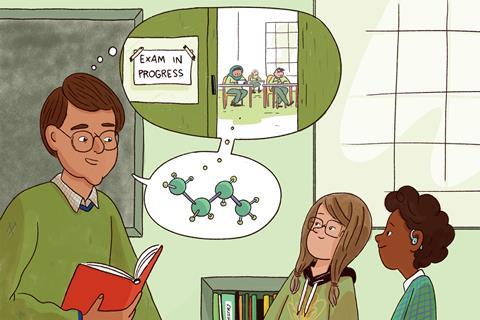Discover how knowing the ins and outs of Highers, GCSEs and Leaving certificate will improve your students’ results

Teaching chemistry is a balance between fostering a broad foundation in the subject and enabling students to be successful in their exams. When teaching for a qualification, the assessment itself affects what and how you teach. But how do you strike a balance between fundamental knowledge and exam preparation? And how do you improve your knowledge of the exam system?
The type of and content of exams impacts what and how a teacher teaches. This is known as the washback effect and is described as ‘any change that teachers or learners make to their actions based on the needs of an assessment’. Washback can have a positive effect, for example, both teachers and learners can prepare effectively for the test, or a negative effect, such as when teachers focus just on what the test covers.
Here are some strategies to enhance your knowledge of the exam system and to use this to inform and improve your teaching.
Content and structure
Most qualifications have a specification document that outlines the content and structure of exactly what should be taught and how it will be examined. Familiarising yourself with this document can help guide your teaching and still allow you to teach beyond the specification where you wish to.
Useful questions to ask and answer
- What knowledge and understanding and which skills will be assessed?
- What are the assessment objectives? How do they relate to question 1? What is the weighting of knowledge, understanding and skills?
- How will knowledge, understanding and skills be assessed? Is it written examination? If so, what style of questions (eg multiple choice, short answer, essay)? Is there a practical examination? What knowledge, understanding and skills are assessed in each component of the qualification (eg what topics in which papers)?
Getting to grips with the content and structure of the assessments will help you plan, sequence and timetable lessons to ensure your learners are best placed to succeed in their exams.
Use data from previous assessments
There are two approaches to this: reviewing examination reports and analysing your students’ responses to particular questions.
Exam boards will provide a report on each paper summarising what was answered well and what was not, often with some recommendations. It is useful to read these and integrate this general information into your planning.
If you have access to previous marked scripts, you can do your own sampling and analysis. Pay particular attention to what your students got wrong and ask: is the question particularly hard? Could we improve how this topic is taught? How much time is spent teaching this topic? Is there a clear misunderstanding or lack of knowledge? Are mistakes due to poor exam technique? All this information can inform planning and make the most of a positive washback effect.
Understanding assessment limitations
Each type of assessment has limitations. By understanding these limitations you can improve your teaching and maximise learners’ chances of success.
Multiple-choice questions
- Focus on very specific knowledge and understanding.
- Learners can underestimate the difficulty of these questions.
- Unless the learner has a deep understanding, the distractor answers can be convincing.
Short-answer questions (1–2 marks)
- Precise answers are needed.
- Knowledge of key words and specific definitions is essential to get these marks.
Longer-answer questions (6 marks)
- Responses require conceptual understanding of processes, multi-step explanations or constructing an argument.
- Answers rely on the application of knowledge, understanding and skills prescribed in the specification document.
When there is a change to an assessment, often the first thing an experienced teacher does is work out what to teach and how best to teach it to support exam success. Once this strategy has been established, they can focus on how students can achieve extra marks by considering exam technique.
The next article in the series will focus on exam technique.

6 ways to develop your assessment skills
- 1
- 2
- 3
- 4
- 5
 Currently reading
Currently readingKnowledge of the exam system
- 6
- 7



















No comments yet